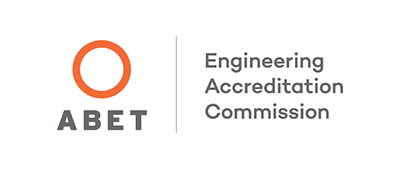- Home |
- Accreditation
Accreditation
The Biosystems Engineering (B.S.) program is accredited by the Engineering Accreditation Commission of ABET, https://www.abet.org, under the General Criteria and Program Criteria for Biological and similarly named engineering programs.

Biosystems Engineering Program Objectives
Within a few years of graduation, our graduates should:
- Be actively involved in engineering design and/or experimental design and have communicated technical information through peer-reviewed journals, presentations or teaching.
- Participate in professional development through the attainment of a graduate/professional degree, professional licensure or participation in short courses or seminars relevant to their field of work.
- Work successfully as part of a team and function as a responsible professional.
- Become leaders in their profession or through volunteer/community service.
The biosystems engineering program continues to grow and improve in both academics and research.
Biosystems Engineering Student Outcomes
By the time of graduation, students will be able to demonstrate:
1. an ability to identify, formulate, and solve complex engineering problems by applying principles of engineering, science, and mathematics
2. an ability to apply engineering design to produce solutions that meet specified needs with consideration of public health, safety, and welfare, as well as global, cultural, social, environmental, and economic factors
3. an ability to communicate effectively with a range of audiences
4. an ability to recognize ethical and professional responsibilities in engineering situations and make informed judgments, which must consider the impact of engineering solutions in global, economic, environmental, and societal contexts
5. an ability to function effectively on a team whose members together provide leadership, create a collaborative and inclusive environment, establish goals, plan tasks, and meet objectives
6. an ability to develop and conduct appropriate experimentation, analyze and interpret data, and use engineering judgment to draw conclusions
7. an ability to acquire and apply new knowledge as needed, using appropriate learning strategies
The Biomedical Engineering (B.S.) program is accredited by the Engineering Accreditation Commission of ABET, https://www.abet.org, under the General Criteria and Program Criteria for Bioengineering and Biomedical and similarly named engineering programs.

Biomedical Engineering Program Objectives
Within a few years of graduation, our graduates should:
- Be actively involved in engineering design and/or experimental design and have communicated technical information through peer-reviewed journals, presentations or teaching.
- Participate in professional development through the attainment of a graduate/professional degree, professional licensure or participation in short courses or seminars relevant to their field of work.
- Work successfully as part of a team and function as a responsible professional.
- Become leaders in their profession or through volunteer/community service.
The biomedical engineering program continues to grow and improve in both academics and research.
Biomedical Engineering Student Outcomes
By the time of graduation, students will be able to demonstrate:
1. an ability to identify, formulate, and solve complex engineering problems by applying principles of engineering, science, and mathematics
2. an ability to apply engineering design to produce solutions that meet specified needs with consideration of public health, safety, and welfare, as well as global, cultural, social, environmental, and economic factors
3. an ability to communicate effectively with a range of audiences
4. an ability to recognize ethical and professional responsibilities in engineering situations and make informed judgments, which must consider the impact of engineering solutions in global, economic, environmental, and societal contexts
5. an ability to function effectively on a team whose members together provide leadership, create a collaborative environment, establish goals, plan tasks, and meet objectives
6. an ability to develop and conduct appropriate experimentation, analyze and interpret data, and use engineering judgment to draw conclusions
7. an ability to acquire and apply new knowledge as needed, using appropriate learning strategies
